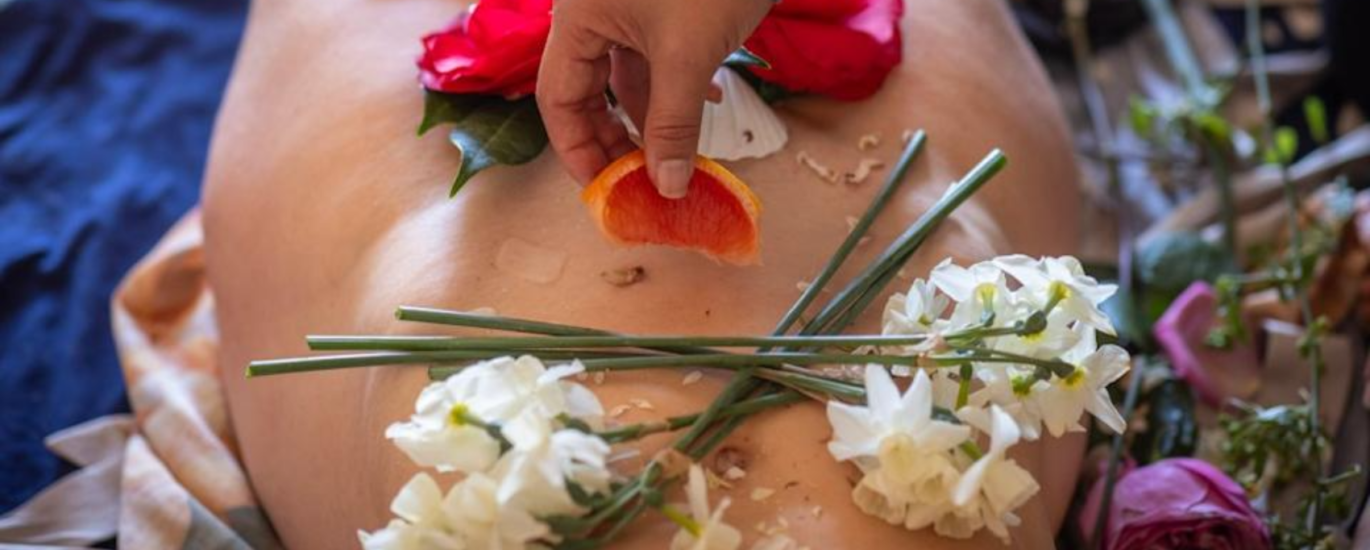“How can you be sexually confident when you’re not in control of your body?”
Amy is joined by Somatic Educator Pamela Madsen to discuss sexual self-confidence, feeling good about vulvas, the healing power of pleasure, and how we can all come back to our bodies through sex and somatic practices.
Our Guest
Pamela Madsen
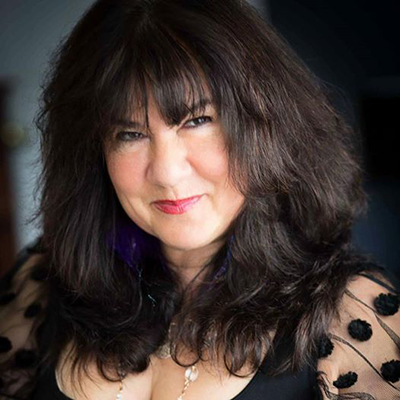
Pamela Madsen is a veteran advocate, activist, and educator. As the founder of Back to the Body, which is now in its 13th year of operations, Pamela’s full-bodied mix of intelligence, humor and vulnerability has made her one of the most mediagenic advocates for integrated sexuality and a taboo-buster around body image. Pamela has a Master’s Degree in Education and is a Certified Somatic Sex Educator.
The Discussion
Amy Allebest: Have you ever thought about sexual self-confidence? What would sexual self-confidence look like for you? What would it feel like and how would you go about becoming more sexually self-confident? Author and somatic wellness coach Pamela Madsen says that developing sexual self-confidence is “actually kind of simple. You develop sexual self-confidence, the way you learn any skill. You find educational resources, emotional support, teachers, and programs that fit you the best. You decide that you want it, and you make the investment of time, energy, dedication, and resources. You dive in and you practice until you get good at it, and then you don’t ever stop practicing. And the good news,” she continues, “the good news about sexual self-confidence is that it will probably cross over into other areas of your life. Having a sexually alive life will flow into every other aspect of your life. I’ve seen it again and again.” Today I am so excited to have a conversation about sexual self-confidence, among other topics, and that promise of whole life empowerment with Pamela Madsen. Welcome, Pamela!
Pamela Madsen: Thank you for having me, Amy. You know, it’s such an interesting topic, especially right now, the way things are developing across our country and around the world, and the rights of women actually being rolled back. So, sexual self-confidence comes from the belief– the root. The root is: I know my body, I’m in charge of my body, I make the rules for my body. My “yes” and my “no” count, my voice counts. When we talk about sexual self-confidence, we’re also talking about sexual authenticity, we’re talking about sexual wellness, we’re talking about sovereignty. And I keep saying to women right now, “Nobody’s coming to save you. There’s no great big white knight that’s coming to save you.” So how does one show up for themselves in the world that we live in right now? The key is also the root of sexual self-confidence, your embodiment. How self-confident are you? Literally in your body. How safe are you in here? How safe do you feel inside your own body? What’s the foundation? What are the bones? We need to stop feeling hypervigilant around our bodies and that cultural, visual judgment, shame about how we look and how we dress and how we age, all the things around how we are perceived in our own physical body, how we perceive ourselves. Those are the bones of sexual self-confidence.
Because if you’re not in your body, if you’re not clear about who this woman is, then you are at the mercy of the patriarchy. Because then you’re just a little marionette being told what to do and what to think. “Don’t you worry, little girl, we’ll take care of you. And if you don’t know what’s best for you, mm-hmm we do. We’ll take care of it for you, little darling. You don’t have to worry your little head about this.” So we are infantilized and we are commodified, honestly, mostly by our looks and then maybe around our earning power. But it’s usually a very visual thing. So women need to do the work around reclamation of body self-confidence, around body safety, around my body. So, becoming a sexually self-confident woman, a really big title, that’s a really big name, and I would encourage people to take it step by step. The first thing: what do you do with your eyes when you’re outside? Do you talk to people, look at people, smile at people? How do you get dressed in the morning? My mother once said to my husband, as I sashayed into the room, she said, “Pamela, do you always get dressed to be seen?” And my husband said, “Why would she bother otherwise?”
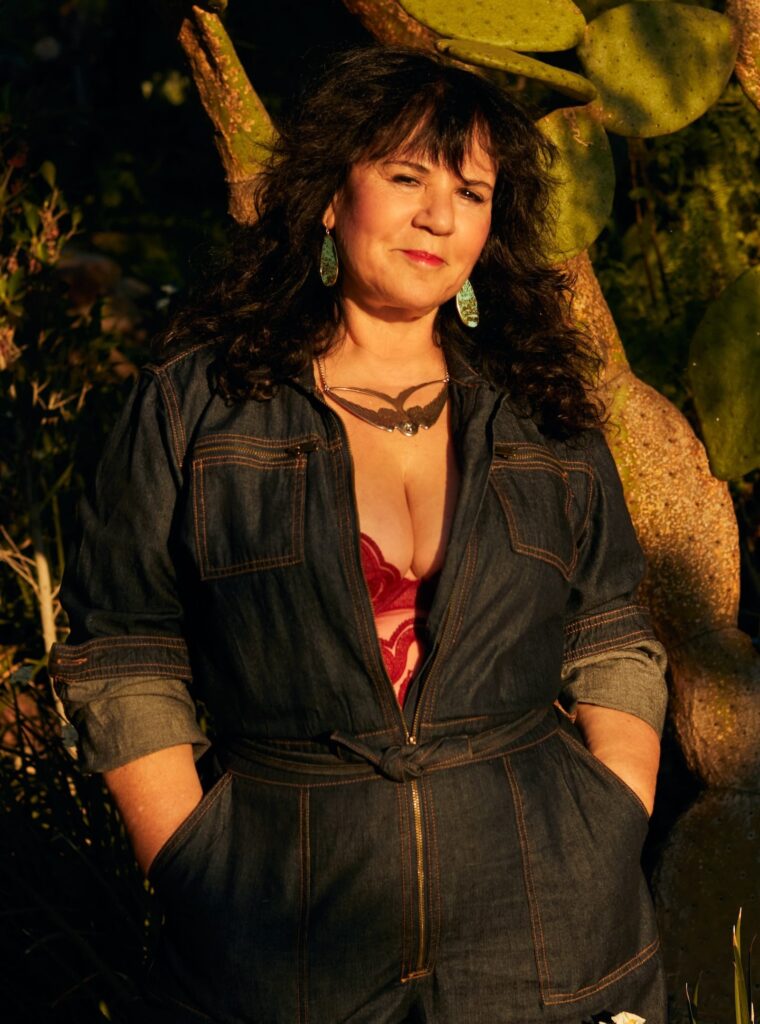
AA: Hahaha, that’s true. I love it. It’s true!
PM: So I got dressed this morning to be with you on this beautiful podcast. You can’t really see my outfit, but I’m wearing this really little top from Paris that I bought to be seen in, that made me feel good in my body. Our clothing speaks about who we are. Who am I today? Well, I’m a teacher and I’m feeling a little passion-forward, and I’m feeling a bit artistic, and I want to show up to be with Amy in that. That’s the flavor I’m feeling. Pioneertown sex goddess.
AA: I love it. That’s what you’re conveying. You’re laying it down and I’m picking it up. I love it.
PM: So when I dress in the morning, it’s sort of like, who am I today? How do I want the world to perceive me today? I just gave you another tool. It started with eye contact, connecting with the world, seeing how safe that can feel. It can feel courageous. Remember that you are not being courageous if it’s easy.
AA: Right.
PM: We don’t want to push past people’s boundaries, but we want to move their edges. So if it’s edgy for you to put on an outfit that somebody might notice and actually even compliment you on, good job. You are putting yourself out there to be seen. And the willingness to be seen translates into confidence, whether that is erotic confidence, sexual confidence, or in your work life. Because it’s all one. We’re whole women. You are whole. The parts of you that you dislike, your shadows, your addictions, your habits where you’re generous and smart and sexy and willing, they’re all there. You don’t get to be half a woman. And if we are talking about women standing up against the patriarchy, well then darling, you don’t get to be half a woman. You need to be a whole woman. And that takes work. And I think that people are looking for five easy steps to become a sexually confident woman. And I’m like, “Well, there aren’t any.” What it requires is what you read in the beginning: a willingness to actually embrace your shadows.
So maybe I have a fear that if I show up in the world as a sexually confident woman, as a confident woman, as an embodied woman, that I will be shamed by my community. “I’m not being a good or obedient wife or partner or employee.” If I use my voice to stand up to power, which is a term that I use a lot, because yes, this can be patriarchy, but not to muddy the waters too much, it can also be women that we have to stand up to.
AA: Oh, for sure. Because women uphold patriarchal systems all the time. It’s just how it works. We all swim in the water, so we all absorb it. Well, I’d love to start with your story, Pamela. And speaking of a whole woman, I’d love to have you introduce yourself a little bit and tell us where you’re from and then a couple of key points on your life path that brought you to where you are today and the work that you do today.
the willingness to be seen translates into confidence, whether that is erotic confidence, sexual confidence, or in your work life
PM: Absolutely. I am the youngest of three, and quite a bit younger than my siblings. They were Woodstock babies.
AA: Oh wow.
PM: We grew up in a liberal area of Long Island. We’re going back, okay? I’m 60, and my brother and sister are 15 years older than me. I grew up in a house where my brother and sister were smoking pot when they could have said “pot” and “heroin” in the same sentence.
AA: Oh gosh.
PM: You know what I mean? It was illegal, it was naughty, you weren’t supposed to do it. Now it’s legal in most places. But I grew up, it was like “Mommy, daddy, they’re doing it again.” I was that kid. And my brother and sister were very sexually open, and Woodstock and free love. And I grew up, no abuse or anything, this was just my home. My mom and dad traveled for work and I was often in the care of my much older siblings. And I think the reaction to that was I became conservative. My rebellion was not to be an even wilder, sexier, opener person. Like most people, we do the opposite of what we’re raised with. So I met my husband at 17 and got married before I was 20, and I’ve been married for 40 years. And then I had my own moment. It happens to a lot of women between the ages, I would say between the ages of 40 and 60. Because we’re living longer, and I know that’s not everyone, you might have been raising children and they are now old enough where they’re not asking you to take them on play dates, they just would like 20 bucks. It’s a different place. Or you’ve been climbing the corporate ladder and you are finally in the place where you want to be, professionally. Your relationship may or may not be in the place you want it to be, but you have stopped doing a marathon swim and you have enough space and time around you to actually sit in the ocean, tread water, and look around. And that’s what happened for me.
I was 42, everything was where it should be at that point. I had gone through infertility, and we could talk about that another time or later, and I had my children through in vitro fertilization. They were then teenagers and I had been married for 22 years, and I was watching my girlfriends cheating on their partners. I saw how excited they were. I saw how alive they were. “They’re sex goddesses and I am not.” But I didn’t want to do what they were doing. I wasn’t ready for that, and I didn’t want to cheat on my man. I didn’t want that game. I was really rather traditional in what I wanted at that point in my life. And I used to go for regular massages, and my massage therapist was gay, and he was telling me about these erotic massages that he would get, and he would talk about all these things and how it was saving his marriage and how he was growing as a person. And I was like, “You don’t have sex with them?” And he was like, “No, no, no, no.” And I said, “Oh, there’s a hall pass.” I could do this and not have actual intercourse with somebody else and break my marriage values, and explore me. Because I was really interested in exploring me. I had a workout coach, a nutritionist, I needed a sex coach. And I needed somebody that was going to help awaken me. So to shorten the story, and they could read my book Shameless and get the whole thing. But I found my way into the sacred sexuality underground, and that’s what my book is about.
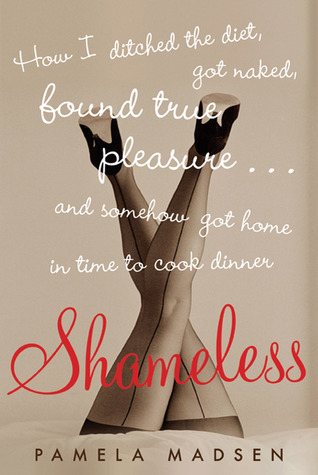
I found my way through it and had good experiences and not good experiences with practitioners holding boundaries and things like that. Nothing nefarious ever happened to me, it was just my comfort level would vary and what I would get would vary. So I got really curious. I kind of wanted to look under Mother Nature’s skirt and understand this somatic work. What is this somatic work? What is sexological body work? What is sacred intimacy? What are these terms? So I signed up for the course and I took the training to be a sexological body worker, which is a terrible name. I like “somatic sex educator” much better and the word ‘soma’, through the body. And I took the training, never expecting to actually use it. I’m not going to go into all the details. Again, people can read the story if they’re curious about my story. I left Fertility, my organization, and I realized that all the women I had been working with, who were going through infertility, were dealing with body betrayal and body image issues and were cut off on their sexuality. There wasn’t a safe enough place for women to go to get what I was getting. And it was quite a journey for me to get to where I was and what I was getting, and my understanding of what women needed as opposed to men. Because anything to do with sexuality has been actually geared towards men. If you wanted to have any kind of experience and you were a man, didn’t matter if you were gay, straight, or bisexual. If you had the proper genitals, you could get whatever you wanted to get. As a woman, it was as dry as the desert that’s outside my window right now. And the experiences that were available for women at that time, they were such a mixed bag.
So I wanted to develop a program where women could come and explore their bodies and become erotically intelligent and become sexually confident and to come back to their bodies. My program isn’t called Back to the Partner, it’s called Back to the Body. Because again, going back to the bones. If you want to be a sexually self-confident woman, you first need to be confident about your body. And I know women who are going to say to me, “Well, that’s very well and good for you to say. And you look like that, and she looks like that, and I don’t.” And what I want to say is that we have, first of all, I’ve been every size and there are photos of me at every size all over my Instagram. And I’ve been almost every age, I’ve been doing this so long. And saying that “you can do this” or “you have to wait until you lose weight,” really what you’re saying is “I’m scared.” When people say to me, “I don’t have the time, I’m very busy,” I sort of look at them and go, “Oh, that’s interesting.” We make time for what we want. That’s never the true reason. That’s the fun little obstacle we put in front of ourselves because we’re scared of what’s on the other side. We’re actually frightened of change. We’re happy with good enough. And I’m not. I am definitely not happy with good enough. Not for me, and not for you, and not for anyone out there.
AA: I’d love to talk about Back to the Body more, Pamela, and maybe a good way into this is to talk about why it’s needed. Because you started this organization, Back to the Body, to help women become sexually self-confident, to come home to themselves. And like you said, to get at the root of ourselves, which is our bodies that we’ve had since we were born. I mean, it’s the only thing that’s constant throughout our whole lives. And thinking about Back to the Body, like you said, it’s not Back to the Partner, and it’s also back to the body, which implies that we were once in our bodies, like when we were little. And that really resonates for me. I remember a time when I was just at home, I was the agent, I was the subject, not the object, and I didn’t see myself through other people’s eyes. I was just at home and confident and happy in my body. Then for a lot of people, and especially a lot of women, and I’m guessing a lot of listeners can relate to this, there’s this separation that happens. There’s this estrangement where we become estranged from our own bodily selves. And there are a lot of things that cause this separation, and we’ve talked about them on the podcast before, different patriarchal things. But things that come to mind for me are religion, a lot of times it really estranges us from our bodies, body image trauma from the media making us feel like we’re never good enough, sexual abuse can do that, purity culture can do that. What are some of the things that you see in the women you work with that have estranged them from their bodies? And then after you answer that, we can talk about what you do to bring them back home again.
PM: Well, you just named them. You basically named most of them, which is how women are viewed in our insular communities, and how did your mother and your father hold you as a young woman growing up? Were you taught that you had to be protected? Were you taught that your virginity was a commodity? That you truly couldn’t be trusted, either, to make decisions about sex? And that’s very big. That’s maybe one of the hardest things women have to reclaim, is that actually they do know and their body actually does belong to them and not their parents or their church or their temple or their mosque or whatever it is that they are a part of. So helping women go through a reclamation of themselves because of the messages that we are given. And we’re given messages about body size, and we’re given messages about youth and looks, and we’re given messages about our value, like if we don’t produce babies, that’s the newest one. Then we can’t really be a whole person…
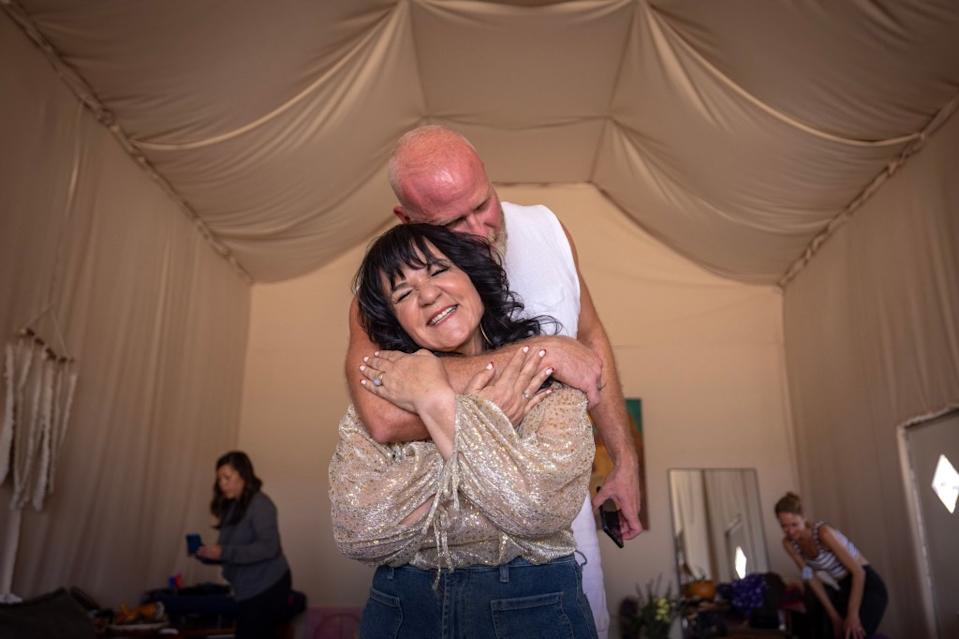
AA: Well, that’s old for Mormons, I’ll tell you that.
PM: It’s just new to me on the evening news.
AA: Yeah, yeah, yeah.
PM: I don’t want to be political about it, and at the same time, this is political. Where our country is right now, who we voted for. We. Whole country. Voted. And we have voted for cheaper egg prices versus the dignity and welfare and health of our women. That’s what’s happened. That’s just a small piece of what’s happened, but it’s a piece where my lens goes. There’s all this other noise. Honestly, Amy, I mostly am paying attention to the messages that are being given to women right now. And what’s so frustrating is that we have women who have been fighting against this for like 50 years, and we’re just getting out on the other side of it, and it’s back. We’re going to do to women even if they don’t want it, and they’re not whole unless they have children and they should be married and making lamb chops… It’s like, wow. The women who have not recovered yet, who may be in their forties, fifties, and sixties, are now doubly reinforced again.
And the young women who are coming up are now being given this message. The message is that you are a commodity, not a sovereign woman. How can you be sexually confident when you’re not in control of your body? And that’s why I come back to “Nobody’s going to save you.” Women, actually, it’s your job right now. If you’re a woman out there, it is imperative for yourself and for your daughters and your sisters and all womenkind to get right with your body right now. Because if you’re not right with your body and you’re not right with your sexuality, there’s no way that you’re going to be able to fight the fight against patriarchal models because you will just practice the art of enduring and appeasement. Women have been really good at the act of enduring and the act of appeasement that has nothing to do with sexual self-confidence. That’s about being a tool of the patriarchy.
So my work, the work of Back to the Body, is to provide safe spaces for women to find their voice, to face shame. I’ll take a step back and I’m just going to say one sentence here: Your mother did the best she could with what she knew, and your grandmother did the best she could with what she knew. I’m not into mommy bashing and blaming. It is now up to you as an enlightened woman who knows better to say, “Thank you, mom, for doing the best you could with what you knew. And actually, I’m going to live my life this way now and I want reproductive rights.” Without reproductive rights, I can’t have sexual self-confidence, because how do you have sexual self-confidence if having sex becomes scary? That’s what’s happening, Amy. Sex is becoming a big risk for women. We thought we had the right to birth control. We thought we had the right to choose, and I’m not going to go into people’s ethics around any of that, but there are a whole lot of people out there in the world who thought that was their right. And with those rights being taken away, our sovereignty’s being taken away. How do you become sexually self-confident if you are frightened of getting pregnant?
if you’re not right with your body and you’re not right with your sexuality, there’s no way that you’re going to be able to fight the fight against patriarchal models
AA: And I would say too, even just the cultural messaging of, wait, who makes decisions for my body? And it’s a bunch of men, it’s a bunch of old white men in suits that have never met me. Even just that message, it’s trying to rob us of that sovereignty, right? You have the power to make a choice for my body.
PM: And I will die for you. It’s not just about getting pregnant, it’s about any kind of reproductive disease that can happen that can form sepsis and they’re frightened of treating us if we’re having a miscarriage. Or we’re having a tubal pregnancy or whatever else goes wrong. People are frightened of caring for us, so it puts us at great risk. So the blowback to that is that we close more. And what I’m asking women to do is to open more. And to open from a place of self confidence, to open from a place of “this is my body and I will fight for my body and I will fight for other women’s rights to their body.” And that includes pleasure.
AA: Yeah, and I do want you to talk about that because that’s the next place I want to go. As you know, Pamela, because you and I have talked about this before, and you know me a little bit, I tend to be quite a cerebral person and I approach things through reading books and talking to other smart people. And I know that a lot of listeners will relate to this too, like maybe even going to therapy and maybe diagnosing an issue of like, “I think I’ve been kind of severed from my sexual self,” or “I feel this estrangement from my own body.” And we can do the education about it and understand it, but there’s this jump, there’s this thing that’s missing sometimes when you have the understanding and you can even have beliefs in your head of like, “Oh, that’s not aligned with my values. I want to be at home in my body. I want to accept myself as I am. I want to have pleasure. I want to awaken erotically, even if it’s in my monogamous marriage, but I want to explore my sexual self.” But then getting your body to be on board, especially if you do have body trauma for any of the reasons that we mentioned. This is where you come in, right, Pamela? And that’s why you do somatic work, is that right? Because you can know things in your head and your body just doesn’t get the message.
PM: Absolutely. Amy, you’re right. So many of us will order the books. Actually, I have stories of women who have ordered my book and then put it under their bed for two years because they didn’t have the courage to read my story. It can even be hard to open the book.
AA: Yeah, I get that.
PM: To open the book, to buy the book, to be seen with whatever book it is, right? What’s true is that things have changed in 20 years, and there are podcasts like the one you’re doing, and there are books and there are programs that women can access. But what you really were talking about was that there’s only so far that a book is gonna take you. We actually have to feel in our bodies. We actually have to get naked. Ooh, naked? Be seen? Learn to receive pleasure? What the Back to the Body method is all about, which is based in the roots of sexological body work, is that it is a boundaried relationship, it’s a professional relationship. Our work is focused on a woman, on her ability to identify maybe for the first time what actually feels good in her body. So our practitioners remain clothed, they don’t have relationships with our clients. My practitioners have been with me, many of them for between 15 and six years, a long time. They’re professionals. We mastermind every night amongst all of us about what’s happening with the women who are with us in immersion on retreat.
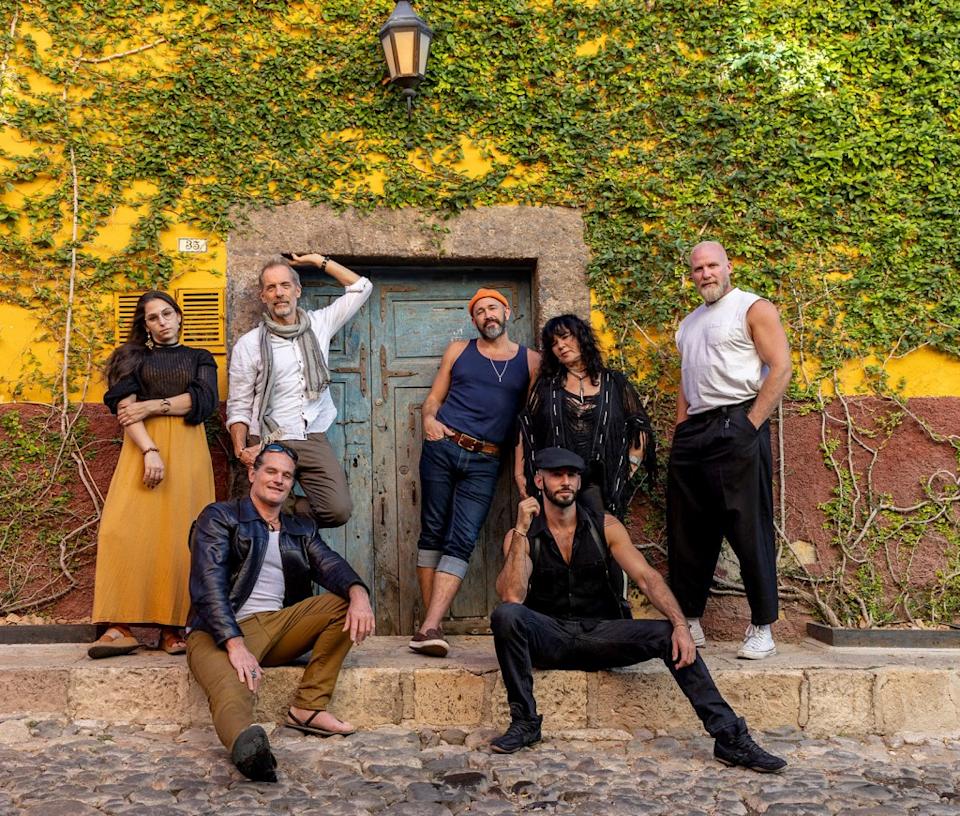
I come from a background of science. I was the executive director and founder of the American Fertility Association. So I have presented in front of a room of 6,000 reproductive endocrinologists, I testify before the FDA and the CDC. What I’m trying to say is that I’m not a new age crackerjack. And many of my friends are, and that’s great, but I’m not. I’m kind of a serious woman dedicated to helping women find their way back into their bodies, to find their voice, to speak back to power, to be able to ask for what they want, to know what they want, and to become embodied and to become individual forces of nature. And that’s what the world is needing right now. It’s needing the feminine to rise. And what we’re doing here is helping women move through shame, trauma, society’s expectations. It’s so hard. It’s so hard because people don’t understand that pleasure is actually healing, that we heal through pleasure. And what I was getting to about being a woman of science is that there is an IRB study about the work that I do that was published, and I’m sure you can put a link to the information that people can read, it’s a 45-page quantitative and qualitative study. And the reason they were able to do the study– and this is important for listeners, because what I hear from women all the time is, “But how will this work for me?” or “This won’t work for me,” or “This isn’t right for me.” What we learned through this study is that women who chose touch and pleasure and support started to have what they call genital self-esteem.
AA: That’s so powerful.
PM: They started to feel good about their vulva, and they stopped having stories about their vulvas being deformed or smelly or weird. So many women couldn’t pick their vulva out of a lineup. And so to be able to recognize your vulva, you know, know her. What we learned was that women found their voice. Women were able to ask for what they want, know what they wanted. Women found out about arousal and orgasm. Women released trauma through these experiences, and they healed their relationship with other women, which is critical if you’re talking about wanting women to rise up. We need to rise up together. And women being able to actually initiate sexual encounters, that’s big. And if you’re worried that it won’t work for you, well this is a repeatable model and that’s why they studied it. Because I had this very fabulous little recipe that I have that supports women through a week-long process.
What’s really quite lovely to say and hard to say is that this isn’t a sales pitch because I hardly have spots available. My 2025 programs are 75% sold out, and we’re planning 2026. So this is not about wanting to sell you a program, it’s about trying to alert women that somatics, touch, becoming a sexually confident woman, becoming an embodied woman, getting the tools that you need, is not frivolous. It’s what you should be putting in front of your life. Because women who do this work and who become embodied and who become sexually self-confident, step by step by step by step– And I usually say to women, “Give me a year” and then I watch them move across the country and then I watch them start a business or change a business or get married or get a divorce. I watch women literally change their lives. And I think it’s the changing of our lives, that is the edge that so many women are frightened of. Somehow they feel, “Oh, it’s good enough. Why am I going to shake things up? I can endure this, it’s not so bad. I don’t know what they’re talking about anyway. Arousal, orgasm, sexual sovereignty. I don’t know, it sounds hippie dippy to me.” Well, it’s not, and I’m not hippie dippy. I could be, but I’m not. I’m a married woman of over four decades with two grown sons, living in the desert.
AA: One thing I’d like to ask you, Pamela, is there a typical woman who comes to the retreat in age or stage of life or belief? Who is showing up to do this work? And then could you share a couple of anecdotes? And I would love for one of those anecdotes to be about your mom, because I believe your mom came and did the work too.
PM: She was 93.
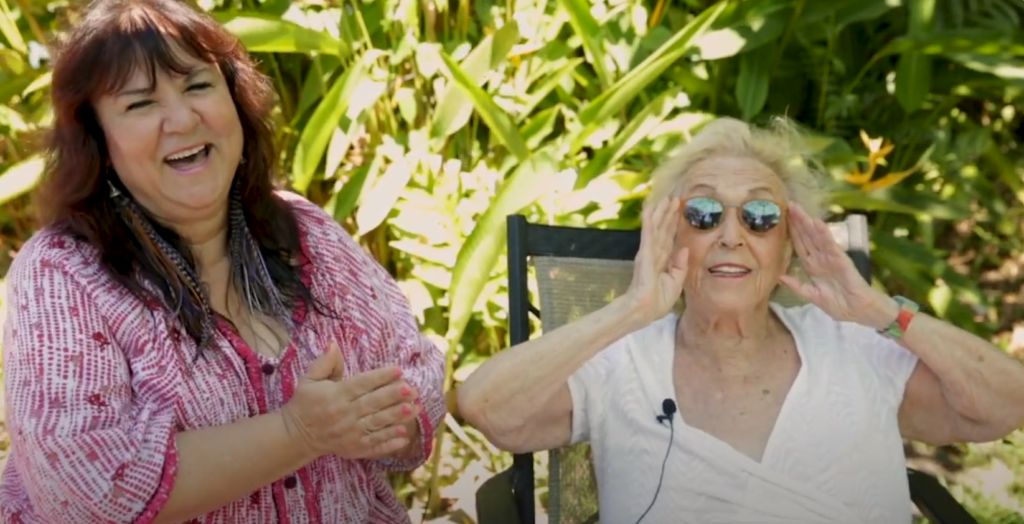
AA: Amazing. Tell us about her first.
PM: Well, my mom has passed. She passed at 96, two years ago. And at 93, before Covid, I invited her to come to a retreat in Maui and she came. And if you want, Amy, you could put the link to the YouTube video and people can actually watch her interview, which is fantastic and public. Find it on our YouTube channel. And what she talked about after she had this experience with her practitioner was that her body still worked. Women are fed a myth that after menopause it all goes away, and it’s not true. And that at 93, after not having any kind of sensuous touch in her life, her body responded the way she remembered it responding, and how important that was, and how women have been sold a bill of goods about menopause and aging and sexuality and what was possible.
So, who are the women? They’re incredibly bright women, oftentimes professional women. You’ll find doctors, you’ll find lawyers, you’ll find psychotherapists, some teachers. You’ll find all kinds of women, housewives or women who are married or women who are single, women who are divorcing, women who are getting married. The age range is more typically between the ages of, I would say 40 and 70 are typical. I get a lot of 35 year-olds and I get a couple women in their eighties. And my mom cracked the ceiling at 90. What does that tell us? Sexuality is evolutionary. Sexuality doesn’t end. Whoever named meno-pause must have been a man, because there isn’t a pause. It’s more like meno-play, meno-sexual, meno-curious. Menopause is not a disease, it’s a stage of our life that actually can give us a tremendous amount of freedom, where we can stop worrying about some of the things that we worry about as women, erotically. Women come to the program with a deep desire to reconnect to their sexuality, to reconnect to intimacy, to heal trauma, to reclaim their body. Women come who feel like they’re sex goddesses, but want to know more about themselves. I have women who gobble up all my retreats, who are on their eighth and ninth retreat. It supports a lot of women to actually stay married rather than get divorced.
AA: Can you talk about that a little bit?
PM: Well, there are things that we do for ourselves. And getting on the table and doing this kind of somatic work is not lovership. It’s a different kind of erotic expression. It’s a different kind of learning about sexual energy. It can be like prayer or trance states that you don’t necessarily get in a marriage bed. A marriage bed is very interactive, it’s “What can I do for him?” Most women are worried about taking too much time, or other stuff that they worry about. The work that happens here is much more internal and private to each woman, where she can fully express her erotic creature without judgment or fear. For one woman, that may be being able to move her leg and for another woman it may be dancing on the table. I have this one anecdote, you asked for one. The woman was on the table with the practitioner and she said, “I want to open,” and she’s crying, saying, “I want to open, I want to open.” And he was like, “That’s beautiful, darling. Can you notice your body?” And her body was like a plank. Her legs were sealed shut, and her arms were to her side. It was the opposite of open, it was closed. So he was able to gently have her notice that while her mind was saying, “I want to open,” her body was closed. And then he very gently helped her to loosen her arms and flop open her legs, very slowly so that she was more of a picture of an open vessel than a closed vase. So often we say that we want something, but we don’t actually really understand somatically that we’re behaving completely differently.
AA: This is where trauma presents itself, right? And I was going to ask you to go into that a little bit more, and then you did, what that would actually look like. I think that probably often this somatic work and pleasure somehow allows people to unblock things in their bodies that are blocked and release the trauma, right?
often we say that we want something, but we don’t actually really understand somatically that we’re behaving completely differently
PM: Yeah. Through sound, through touch, through pleasure. And we don’t even exactly know why. Women will often or sometimes cry in their sessions, scream in their sessions, even in pleasure, even in the pleasure of orgasm there’ll be tears. And what’s happening is that their body is somatically like a sponge being squeezed, releasing trauma. And they feel better and they feel like there’s more space in their bodies, and we don’t really know yet. What’s the science behind that? But the body somatically, without us trying, through touch, sound, movement, attention, care, releases trauma and we feel better.
AA: Yeah. I want to ask you, and this will probably be one of the last questions before we wrap up, you’ve said a couple of times that this also helps release trauma and it helps women find their voice. I know that you have before used the term “like an open channel from vulva to throat.” I read that from you once in an essay you wrote, and that resonated so strongly with me. I felt that. Again, the traumas that we accumulate over the course of our lives, the sexual traumas and sexual shame, whatever form that comes in, creates these blockages in that channel. So I wondered if you can talk about that and maybe with an example that you’ve had or that you’ve seen of opening that channel. And again, it’s kind of this mysterious thing that the pleasure, the acceptance of the sexual self, allowing the sexual self to be what it was created to be, somehow opens that channel.
PM: We actually stopped gaslighting ourselves. When we open that channel, when we’re able to actually hear, your body is telling you things all the time. We don’t listen. You don’t need men to do it, you can do it. We gaslight ourselves all the time. So what happens when we start to rebuild sovereignty in our bodies, sexual authenticity, who we are, we start to be able to hear the voice that our body is telling us. And call it your intuition, believing your body. And when your vulva is open, she’s a channel for you. Women, you have the womb of creation in your body. We are different. That’s why we’re so scary for men, because we hold creation in our body. And if your pelvic floor is clenched, then your throat is clenched. If your pelvic floor is open and wide, your throat will be open and wide. The same cells that are in your throat are in your vagina. It is a chain and it is a loop. And when we get that flowing, magical things happen for women. They finally say what they need to say, they don’t just walk out. They actually can stay for repair. But if you’re closed, if your pelvic floor and your vulva and your throat are closed, you are more likely to respond to difficult situations in one of two ways. Appease and endure, or walk out. I mean, why is our divorce rate so high? Because we don’t have a voice so we leave. Or we don’t have a voice until our partner is so frustrated with this closed-up woman that they leave. So if we can open our channel, we can receive more, we can speak more, we can share more. We can learn about repair, we can learn about staying in with no promise. We can create new lives. I’ve seen women move from one part of the world– I have a woman who, I swear after each retreat she moves. She moved to Hawai’i and then she moved to Mexico and she’s built this extraordinary life for herself in Mexico. She changed her life. She looks different, she talks differently, and she’s not frightened. And you could say, “Well, I’m not frightened.” Alright, maybe you’re not. But when you walk down the street, are you looking around? Are you hypervigilant? Are your eyes down? Are you pretending or on your phone? Take a look at yourself. Are you an open vessel that’s ready to change the world, or are you covered in armor and you can barely move? I want to see women as open vessels.
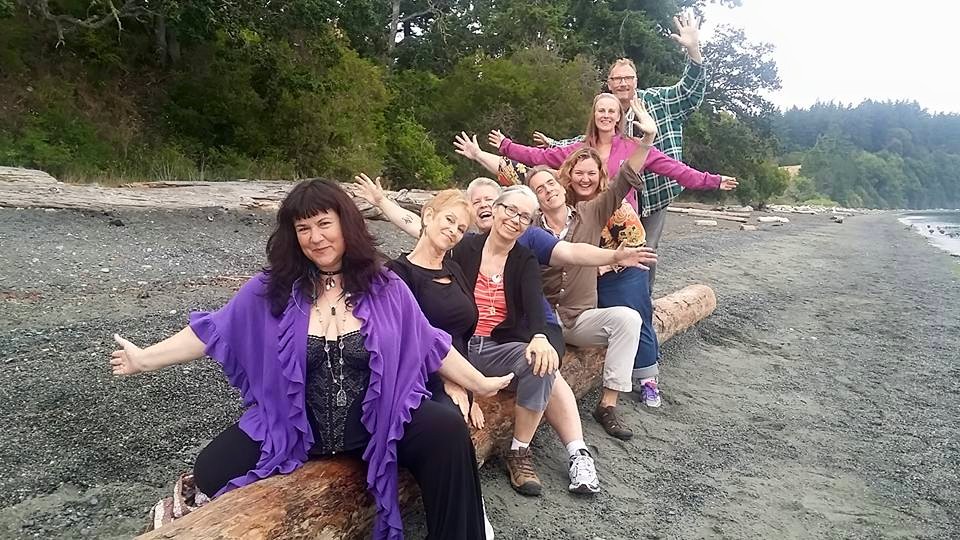
AA: I love that, Pamela. One thing that I am learning in my own self as I’m hearing you talk about this, is when you said that our bodies are communicating to us all the time, I’m connecting that to what we talked about of that being, again, I use the word “severed” because that’s kind of what it feels like sometimes to me. That’s what I’ve experienced a little bit, is that the sense of being severed from sexuality is being severed from our own true selves, severed from that person that we were when we were young before all the damage got done. So, healing that, bringing that back together, creating that healthy channel, it makes sense to me now why that would be so healing and then also empowering. Because then we’ve got all the parts of ourselves. You talked about being whole women at the beginning of the episode. We’ve got that little girl that isn’t so scared anymore to come out, and we’ve got that teenager with raging hormones that’s finally like, “You’re listening to her.” You’re not slapping her hand and saying “No” when she’s saying “Yes,” or saying “Yes” when she’s saying “No, I don’t want that.” And you just say, “Okay, I’ll listen to you now. I will listen to you.” And bringing all the parts of ourselves into conversation and into the family, then we can have our full power. It is all coming together for me in a really beautiful and powerful way. So if I can ask you one last question as we leave, one of our themes this season is action. How do we take action even if it’s small? I’m wondering if you could leave our listeners with a couple of things, wherever they are. And people are going to be listening to this in vastly different places sexually, where they are in their evolution. But what are a couple of things that you would say “do this.”
PM: Do this: get friendly with your own vulva. Actually touch her, look at her. Tell her nice things about herself. Get friendly with your body. You don’t have to love your body, you don’t have to like, “Oh, self-love, I love this.” You know what? We all have different feelings about our different parts. You don’t have to always love. Can you get friendly? Can you start to accept yourself? Do something that requires some courage. Maybe for you it’s buying that first book. Maybe for you it’s attending one of my virtual programs or attending one of my portals, which don’t involve you getting on a table and receiving full somatic work. Call. Get a free consultation. Tell your story. We have a free consultation. You speak to a sexologist, it’s a chance to tell your story. Maybe you just want to take the free consult to have somebody hear you tell your story. Not your best friend, your sister or your mother. A safe person. Anonymous, in many ways, to tell your story. And then juice up. And there are lots of people, build your team, there are lots of people available to help you build your team, but you have to start somewhere. And if you don’t start, I’ll see you next year on the same podcast. You’ll be wearing the same gray sweatshirt. You’ll be on your couch and a whole year will have gone by of your life. And to me that’s sad. So you don’t have to know if it’s going to work for you. I’m going to tell you that it will.
AA: I love that. Well, that’s the perfect way to end, too, because to wrap up, I’d love to have you tell listeners where they can find your work.
PM: Sure. I’m at backtothebody.org. They can find me on social media on Instagram @thepamelamadsen, on Facebook, Pamela Madsen. I’m verified in all those places. It’s the real verification, it’s not the paid-for one because I’m that cool. Yeah, I’m not hiding. And we have a six-month sovereignty program starting in January. I don’t know when this is going to be released. It’s going to be running every six months. It’s virtual and you can also be in person, and the virtual is not expensive. So there are baby steps that women can take, but if you don’t do anything, you’re going to be exactly where you are tomorrow.
AA: Yeah. Well, Pamela Madsen, thank you so much for this conversation and thank you for your work. This is so important. And just to summarize again, the incredibly inspiring vision I have of individual women finding themselves and reaching their own potential is so beautiful. And then the collective power of women being connected to themselves and speaking and not inhibited. It’s a pretty inspiring vision. Thank you so much for your work that you’re doing.
PM: It’s a pleasure, Amy, this was lovely.
Are you an open vessel
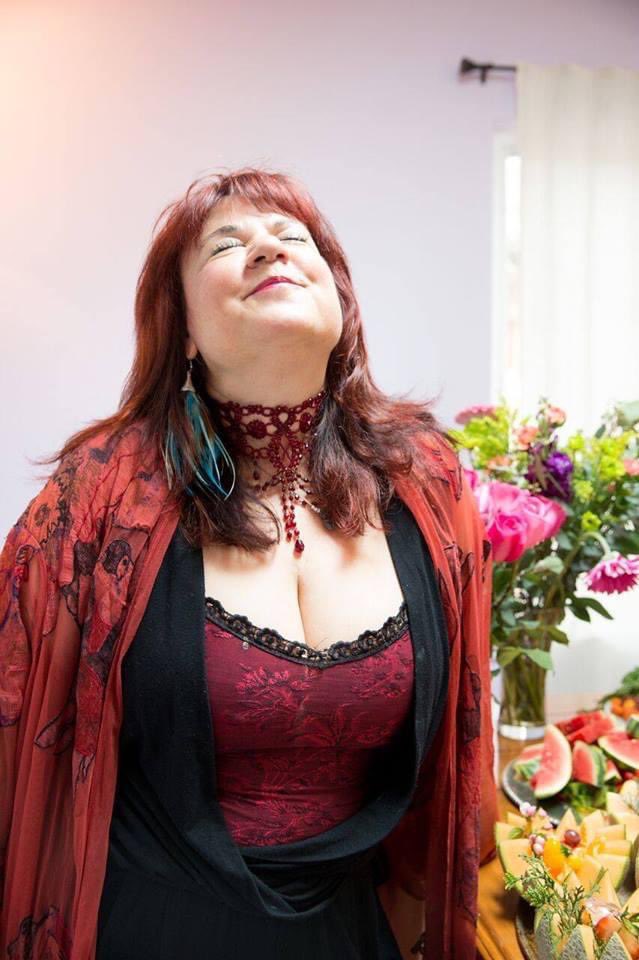
that’s ready to change the world?
Listen to the Episode
&
Share your Comments with us below!

